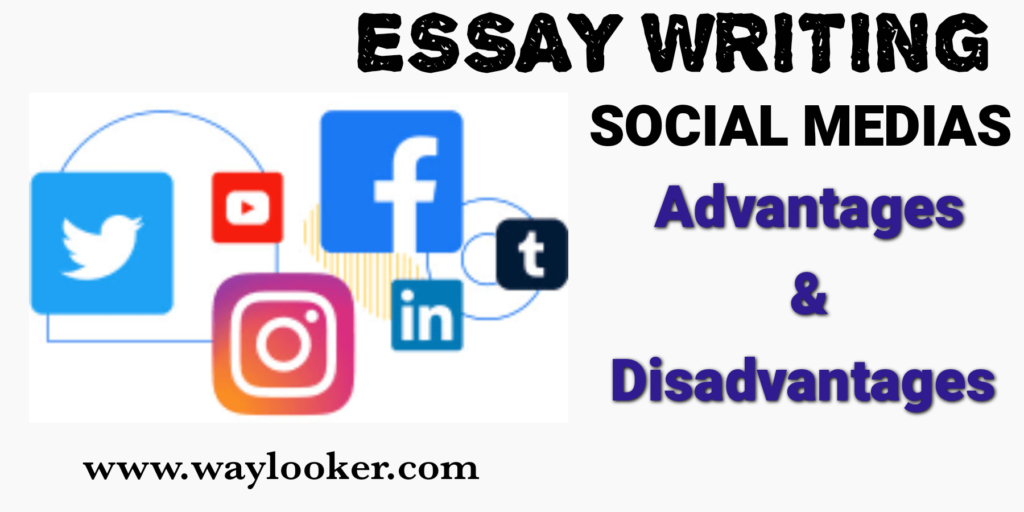Here is an essay on Essay on social media advantages and disadvantages. You will get much interesting elements of good essay writing in this essay. So read the full essay and prepare yourself.
Social media has become a potent instrument that is revolutionizing how individuals interact, share information, and connect with others globally in the present era of digital connectedness. Its influence on society is undeniable since technology has benefits and drawbacks that affect how we communicate, share information, and view the world.
- PRIZE GIVING CEREMONY IN YOUR SCHOOL
- ANNUAL SPORTS DAY IN YOUR SCHOOL
- SCHOOL HOSTEL LIFE
- ESSAY ON STUDENT LIFE
Essay on social media advantages and disadvantages
Social media has revolutionized contemporary communication by facilitating information sharing and worldwide connectivity. Now Social media sites like Facebook, Twitter, and Instagram make it simple for users to communicate, trade thoughts, and share material with one another globally. Social media gives opportunities for networking and creative expression, but it also has drawbacks like false information, privacy worries, and possible harm to mental health. Its impact on society is evident, necessitating ethical use and a critical assessment of its benefits and drawbacks.
What are social medias?
Social media refers to a group of online platforms and websites that let people connect with one another and create, share, and interact with content. These platforms make it possible to communicate using a variety of media, such as text, pictures, videos, and links. Social media sites like Facebook, Instagram, Twitter, LinkedIn, TikTok, YouTube, Snapchat, and Pinterest are examples of well-known ones. Each platform has its own distinct functions and features, spanning from social activism to professional networking, content sharing, and personal networking and enjoyment. Social media has transformed how people connect, acquire information, and engage with the world around them, becoming a crucial component of modern communication.
Advantages of Social Media:
1. Global Connectivity:
Geographical restrictions are removed through social media platforms, enabling people to connect and converse with people around the world. As a result, there has been an increase in cross-cultural dialogue, the development of global friendships, and knowledge of world problems.
2. Information Dissemination:
Sharing news and information via social media is quick and effective. By letting people to share personal stories and perspectives on current events, it has democratized the news distribution process and put pressure on traditional media monopolies.

3. Networking and Professional Opportunities:
Networking can take place on social media platforms, where professionals can interact with peers, mentors, and prospective employers. Sites like LinkedIn are especially helpful for job success since they let people highlight their accomplishments and talents.
4. Social Activism:
Social media has strengthened political and social movements by making it easier to plan protests, raise awareness, and organize fundraising initiatives. It gives underrepresented voices a stage to be heard and has been crucial in bringing about change on a number of fronts.
5. Creative Expression:
With the help of websites like Instagram, YouTube, and TikTok, people can now showcase their talents, promote their artwork, and develop their personal brands. As a result, stardom has been more accessible and new entertainment genres have been created.
Disadvantages of Social Media:
1. Spread of Misinformation:
The potential for disinformation to spread quickly on social media is one of the biggest disadvantages. Viral dissemination of false or inaccurate information can result in erroneous beliefs, panic, and societal instability.
2. Privacy Concerns:
The sharing of personal information by users on social media sites is frequently required, and this information can be used by malicious parties for identity theft, cyberbullying, or other types of online harassment.
3. Addiction and Mental Health Issues:
Social media’s addictive qualities, which include regular notifications and the need for approval from likes and comments, can contribute to mental health problems like anxiety, despair, and low self-esteem.
4. Filter Bubbles and Echo Chambers:
Filter bubbles and echo chambers can arise when social media companies’ algorithms display users only content that supports their preexisting opinions and preferences. This may obstruct the discussion of many points of view and increase polarization in society.
5. Diminished Face-to-Face Interaction:
Overusing social media may result in less face-to-face engagement, which is crucial for creating lasting connections and honing communication skills.
6. Cyberbullying:
Cyberbullying can have serious emotional and psychological repercussions for victims and is made possible by social media. Online interactions’ anonymity can give people the confidence to engage in destructive behavior that they might not otherwise choose to do in person.
Conclusion:
The complicated phenomena known as social media has both benefits and drawbacks. It has altered how society interacts and communicates and has the potential to enable global connectedness, information distribution, and social activity. However, there are important difficulties that must be addressed, including the dissemination of false information, privacy issues, addiction, and detrimental effects on mental health.
It’s crucial to balance social media’s advantages and disadvantages as we traverse this digital world. In order to maximize the benefits while minimizing the drawbacks, responsible use, critical thought, and understanding of potential hazards are essential. To establish a digital environment that promotes meaningful relationships, supports the sharing of factual information, and protects the well-being of its users, society must collaborate.
